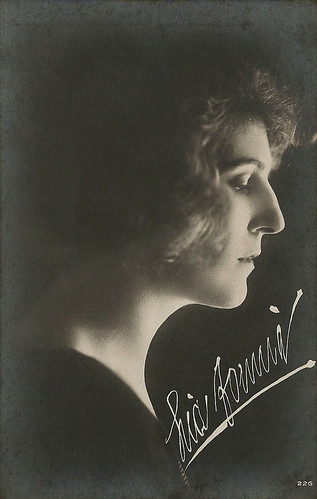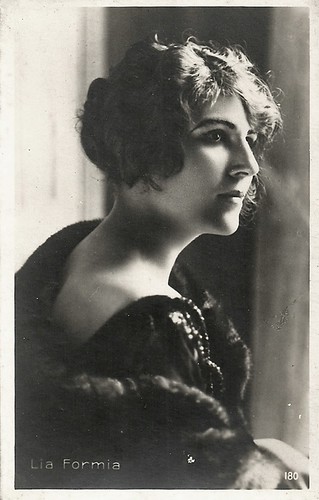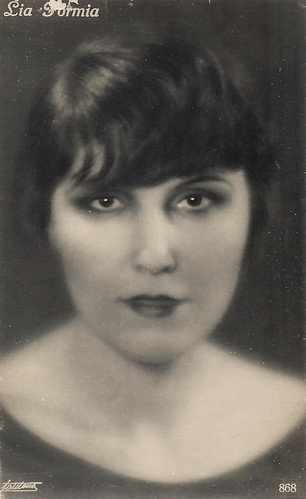
Italian postcard, no. 226. Collection: Didier Hanson.

Italian postcard by Fotocelere, Turin, no. 194.
A lovely, humorous and action-packed spoof
Lia Formia was born in Naples, her birth date is unknown. She probably made her film debut in Le figlie del mare/The Daughters of the Sea (Luigi Caramba, 1918).
From 1920 on Formia played for years under the direction of Lucio D'Ambra, mostly with Umberto Zanuccoli as her male co-actor. Probably her first film with D'Ambra was La storia della dama dal ventaglio bianco/The story of the lady with the white fan (Lucio D'Ambra, 1920), the story about a woman of easy virtues as soon as her husband is away. Formia already had the female lead in the film.
She played then the lead roles in Due sogni ad occhi aperti/Two dreams with eyes wide open (Lucio D'Ambra, 1921), La fine dell'amore (Gian Bistolfi, 1921), Gli angeli custodi/The guardian angels (Lucio D'Ambra, 1922), Crocetta d'oro/The little golden cross (Lucio D'Ambra, 1922), and La sentinella morta/The dead sentinel (Gian Bistolfi, 1922).
L'illustre attrice Cicala Formica/The Illustrious Actress Cicada Ant (D'Ambra 1920) was a short fantasy, perhaps intended to be released together with La favola di La Fontaine (Lucio D'Ambra 1921). The film parodied divismo and still exists, as one of the few films of D'Ambra and Formia found and restored. Angela Dalle Vacche: "The film is a lovely, humorous and action-packed spoof about a young woman (Lia Formia) who wants to be both a director and a diva."
In the end, she fails and the rebellious daughter is tamed by her father. Other films Formia made in the same year were Miss Dorothy (Giulio Antamoro, 1921) starring Diana Karenne and with Romano Calò, Carmen Boni and Formia co-acting, and La falsa amante/The False Lover (Carmine Gallone, 1921), starring Formia herself and based on a novel by Honoré de Balzac.

Italian postcard by Ed. Vettori, Bologna, no. 180.

Italian postcard by Fotocelere, Turin, no. 180.
The bankruptcy of D’Ambra Film
Lia Formia kept very busy in the early 1920s. In 1921 she starred in such silent films as Le confessioni di un figlio del secolo/Confessions of a Son of the Century (Gian Bistolfi, 1921), Il granatiere di Pomerania/The Pomeranian grenadier (Lucio D'Ambra, 1921), and Monique (Lucio D'Ambra, 1921).
In the following year, she could be seen in La favola di La Fontaine/The Fable of La Fontaine (Lucio D'Ambra, 1922), Il miraggio/The Mirage (Lucio D'Ambra, 1921), La principessa Bébé (Lucio D'Ambra or Carmine Gallone, 1921), all produced by D’Ambra Film.
For the same studio, she appeared in S. E. l'Ambasciatrice/S. E. Ambassador (Lucio D'Ambra, Carmine Gallone, 1922) and Tragedia su tre carte/Tragedy in three papers (Lucio D'Ambra). Then D’Ambra Film probably went bankrupt in the crisis of the Italian film industry.
Lia Formia made only one more film, apart from a bit part in La via del peccato (Amleto Palermi, 1925). In 1925 she appeared in Il tacchino/The Turkey (Mario Bonnard, 1925), co-starring Mario Bonnard himself, the French comedian Marcel Lévesque and Maryse Dauvray, the actress from J'accuse. It was an adaptation of the Georges Feydeau comedy 'Le Dindon'. Though the film was internationally successful, Lia Formia's career stopped after 20 films.
About the later life of Lia Formia nor about the place or date of her death, we could not find any information on the net. Do you know more about this Italian actress? Please write a comment and share.

Italian postcard by Ed. A. Traldi, Milano, no. 868. Photo: Fontana.

Italian postcard by Ed. A. Traldi, Milano, no. 869. Photo: Fontana.
Sources: Vittorio Martinelli (Il cinema muto italiano - Italian), Angela dalle Vacche (Diva: defiance and passion in early Italian cinema), Andrea Meneghelli (Lucio D'Ambra: ipotesi per un'indagine isocronica, in Fotogenia 1997-1998 - Italian), and IMDb.
No comments:
Post a Comment